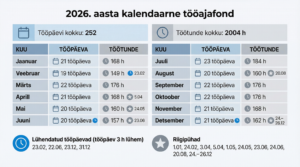Europe is like a vast market with millions of buyers just a few clicks away. The opportunities are tempting, but before you start e-commerce, it's worth realizing that this environment is not entirely without its challenges. There is a maze of tax rules, lurking customs duties and a whirlwind of bureaucracy that can catch a newcomer by surprise.
In this article we explain how VAT, OSS and IOSS systems, and the new small business special regime will affect your journey.
Mari's story: how a dream became a reality
Mari is a young designer from Pärnu, whose handmade jewelry quickly conquered the Estonian market. „Why not sell them in Europe too?“ she thought. She opened an online store and the first orders from Germany and France warmed her heart.
But the joy was soon overshadowed by the first questions that came in: „Why is the VAT rate on the invoice wrong?“ and „Why did I have to pay extra at the parcel machine?“
Mari understood that e-commerce in Europe is not just about translation and shipping, It's a tax maze. Fortunately, he found solutions: OSS, IOSS, and the small business scheme. Thanks to them, he was able to grow his business without drowning in bureaucracy.
Mari's lessons
- Don't underestimate tax rules
Mari thought it would be enough to translate the price list and send international shipments. In reality, she had to learn how VAT works in Europe. - OSS and IOSS saved the day
When Mari joined OSS, the problems with incorrect VAT rates disappeared. IOSS helped avoid a situation where customers had to pay extra at the parcel terminal. - Special arrangements for small businesses: breathing space
Since Mari's turnover was below €100,000, she was able to apply the special scheme for small businesses and thus take advantage of VAT-free trading.
VAT in Europe: the destination principle and OSS
Forget the idea that you only pay taxes at home. The European Union applies the destination principle: VAT must be paid where the customer enjoys their purchase. If your private end-user is located in Paris, then French rules apply.
€10,000 limit: If your cross-border sales exceed this amount, you must consider the VAT rate of each destination country.
OSS (One Stop Shop): It's like a universal ticket - you can declare all your EU sales with one declaration in your home country. Less paperwork, more time to grow your business.
Import, customs and IOSS
If you sell goods of low value (up to 150 euros) that arrive in the European Union from outside, you can use IOSS-special order (Import One Stop Shop). This system allows you to collect VAT at the time of purchase and avoid a situation where the customer has to pay additional amounts unexpectedly at the parcel terminal.
All imported goods are taxed, tax exemption for purchases under 22 euros is history.
If the value of the shipment exceeds €150, additional charges will be added. customs duties. These depend on the type and origin of the goods. Plan your pricing wisely to avoid unpleasant surprises.
Special regime for small businesses – a new lease of life for start-ups
This year brought long-awaited relief to small e-retailers: special scheme for small businesses. If your total turnover in the European Union is less than 100,000 euros, you can also use the tax exemption in other member states. This means that you do not have to immediately implement OSS or register in each country. But it must be taken into account that If you choose the special scheme, you cannot deduct input VAT on your purchases. This is more suitable for traders whose expenses are relatively small.
How to start the tax maze without getting lost?
- Check VAT rates for destination countries (17–27%)
- Use OSS and IOSS systems – they are your best friends
- Assess the suitability of the special scheme for small businesses – it could be a lifesaver
- Plan pricing – consider taxes and customs
- Keep up with changes in the law – the rules of the game are constantly changing
Digital tax reporting is the future
The European Union is moving towards e-invoicing and real-time reporting. According to the vision, by 2030, communication with the state must be automated and simple, and reporting and the right data must be available exactly when they are needed. This creates real value for businesses and helps reduce bureaucracy. If you start today, think about a digital solution – it is an investment in the future.
Is your company's e-commerce ready for European tax rules? If you need support, clarity, or want reassurance that everything is right – võta meiega ühendust.
We help you bring clarity OSS, IOSS and the implementation of the special scheme for small businesses and ensure that your international sales run smoothly and tax-efficiently.



